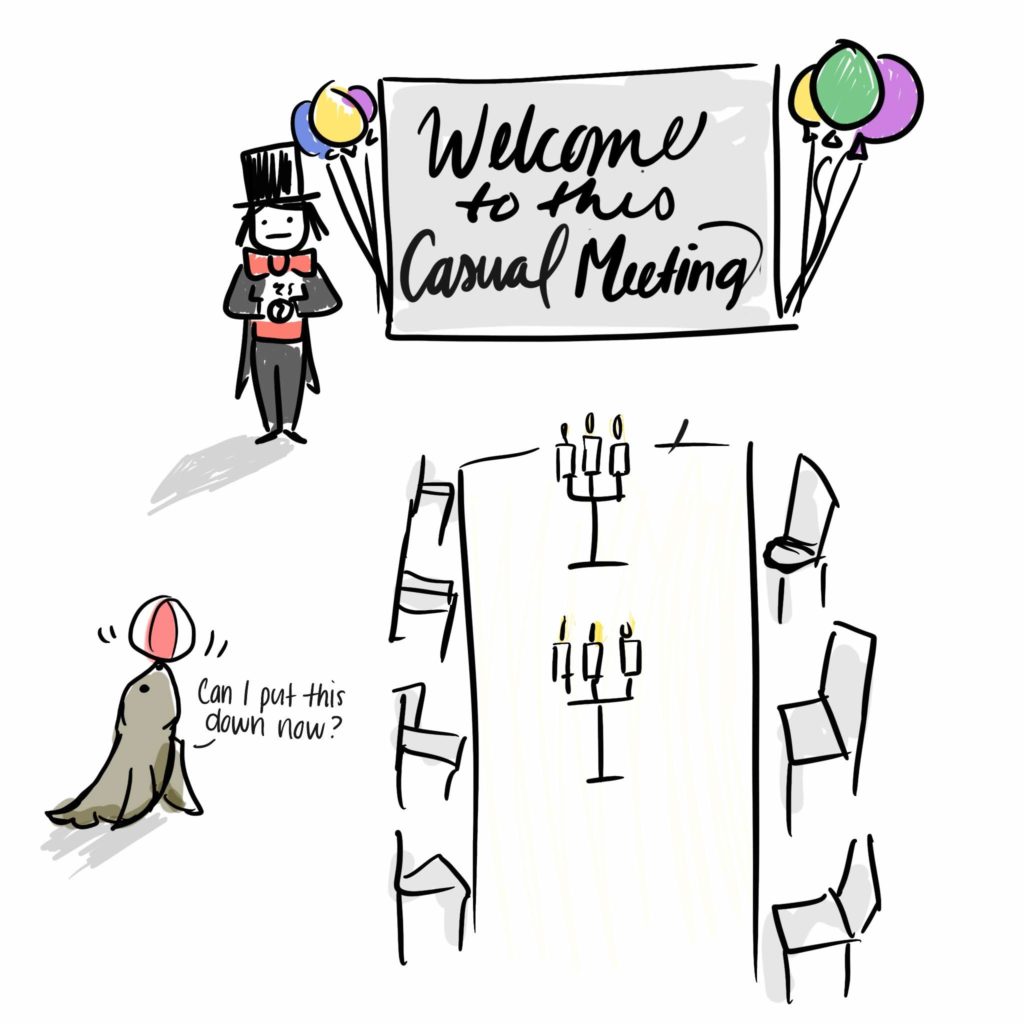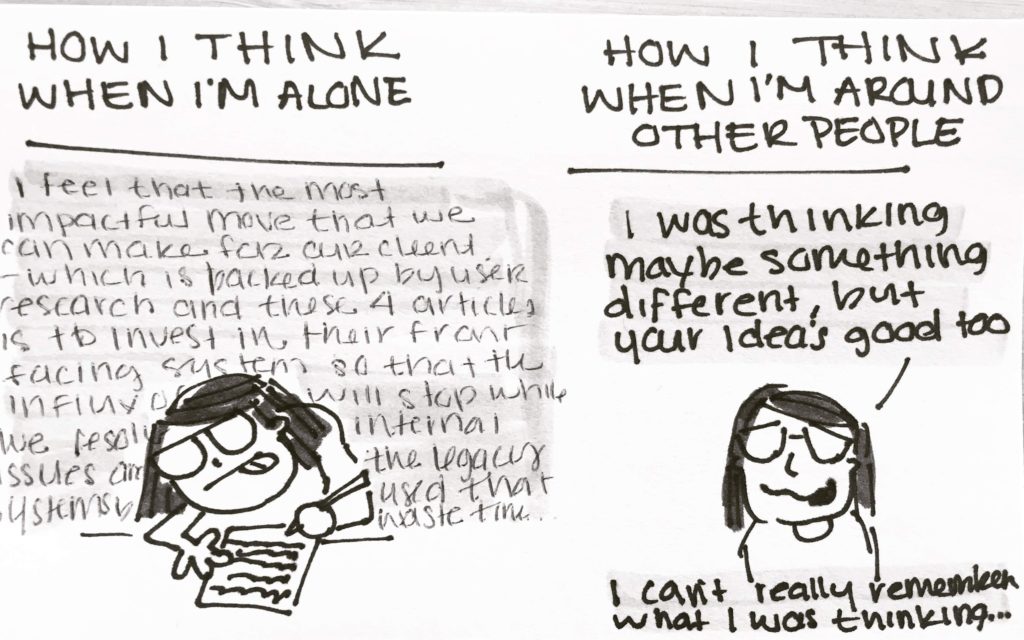My candle burns at both ends;
“First Fig” by Edna St. Vincent Millay
It will not last the night;
But ah, my foes, and oh, my friends—
It gives a lovely light!
Thoughts that’ve been rattling in my head for this week’s edition of Book(ish) Club with Myself.
Other people make you stronger
A common idea in accessibility is: “It’s the environment, not my body, that disables me.” It’s the idea that, given the right environment, people become more capable. It has been a helpful perspective that I come to over and over again. My thoughts on what strengths and weakness are has really evolved over the last few years because I have experiences what a change in environment can do.
I learned that I am actually good at some things I thought I wasn’t. My co-workers were dogged about given me space to share my ideas, encouraging me to present, and lead more work.
I’ll give the example of facilitating meetings and workshops. I was musing recently how I’m also (probably) a much better presenter-facilitator remotely than I would be in person:
- I have learned to convincingly read my notes while presenting. The last time I gave a presentation in person (~3 years ago) I was encouraged to stop relying on my notes. Folks have been emphatic that they can’t tell I’m reading them. (I don’t always read word-for-word, but it is comforting that they’re there even).
- I have a mic right next to my mouth by default as a remote presenter. I am soft spoken and always have a shake start. Even when I’m intentionally talking loud for a presentation, people have trouble hearing me.
- I can exercise finely tuned control over my environment. I’m really good at setting up things to work the way I want when it comes to technology so the tech side of things don’t bother me.
- And honestly, the bar is lower for virtual presentations/workshops because so many people are bad at them so that helps me.

I’ve learned a lot more about what my strengths are. I’ve gotten much more productive feedback on what I bring to a team. It was really helpful for me to get perspective on what different strengths could look like by working with people who actually exhibited them. I think I was used to a strength & leadership being acted on in a very similar way. Who do you like working with? Who challenges your ideas? Are you learning at work? — those might be the leaders for you. Not who wields the most power
Honestly, I think sometimes people are striving for this cookie-cutter version of Strength/Leadership skills that is exhausting. Maybe that’s not right for you. To be fair, I think more people are interested in formal leadership positions than I am, too. I was used to teams where you were expected to be fast and loud. You needed to get noticed to move up. Ask some question after a presentation to show how smart you are. More points if you pick a hole in the idea itself. Daily double if you’re the first person to suggest taking a step back.
Other people weaken you
At the risk of being exclusive: I’ve been watching Ted Lasso with Scott. I like the show a lot and find it refreshing, but this isn’t a review. One of the characters in the show has been doing some mean things recently and Scott mentioned he was disappointed because “[the character] was so nice” and he liked them before, as like an underdog.
Nice. Nice? “He didn’t do anything particularly nice…he was just portrayed as weak,” was my response. When we first meet the character he was either being ignore or being bullied until he gets raised up by someone else. When he’s treated better, rewarded for the skills that were ignored before, we are happy and excited for him. It’s uncomfortable to watch someone being attacked for no reason, you know? But it’s interesting to me that we assume that quiet or ‘weaker’ people are also kind. Even outside of this character (especially if you’ve seen the show) do we assume that people who are meek are kind too? Really they are afraid or powerless. Imagine the dynamics that have to exist between this underdog and the other powerful party. For the person with the advantage they imagine this weaker person like: “They’re being nice because they like me,” or “if they didn’t like being treated that way, they’d do something about it I would do something about it.”
Hmm. This last year we’ve been talking a lot about privilege and power and this tiny moment felt noticeable. I’ve mentioned multiple times in the last year to my co-workers/supervision that I struggle to get good, actionable feedback at work because (I assume) people think I’m too small and fragile to handle it. Men assume that women like getting verbally harassed because they don’t stand up for themselves in the moment, not because they’re worried about their physical safety. Managers say something offhand to their employee and it’s inadvertently really demoralizing because they is such a big power distance between them. Someone assumes the quiet person is nice and plain because they try to take up as little space as possible. Just things.

Truing the wheel
My colleagues and I were participating in a team-building workshop where we had to list things that we did and didn’t like to do. The goal was to understand how we could work together. Someone pointed out that some people would work well together because one person’s strength was another person’s weakness. Like, I had written “I am good at writing documentation” and someone else wrote “I hate writing documentation.”
This should be mundane, but it actually made me realize that I don’t usually work on teams which are greater than the sum of their parts. It’s usually just people assigned to work together who, break off pieces of work, work on it mostly-individually, and then put the parts together. A well functioning version has a rounds of feedback, but they can often be half-hearted. We didn’t engage with each other’s work enough so that moves the team and the work forward very much. I think most people value autonomy at the cost of delivering a cohesive product as a team. A capital-“T“-Team would be one where the quality, not just the quantity of what’s produced is significantly better. I’m not saying I never did (I’m running through memories right now and I’m thinking about teams I miss), but sometimes you get into a routine where it’s like “this is my role, that’s your role, and even if something feels a little off, I’ll keep my mouth shut and keep pluggin’ away.”
Question: Do you know enough about your team to rebalance the work effectively?
So, do you know what their so-called strengths and weakness are?
Here’s level 2: You have strengths and weaknesses. Cool. Do you know which tasks take away energy and what tasks give you energy? I realized I had more strengths than I thought, but I also realize that some—like presenting—deplete my energy and I am more than happy to give it more time to people who are truly energized by teaching and talking. This might not always be possible, but have you thought about ways that you can do more of the things that give you energy and put down some of the things that take your energy? Maybe someone else on your team would enjoy those opportunities!
I’ve found it helpful to refer to think about work in terms of energy more often because you can be capable of something but it’s not where you flourish.
Discernment is all about understanding the nature of your own desire so that you can actually be happy.
Arthur Brooks (from a Freakanomics interview)
I heard Brooks talking about Discernment while this post was in my draft and thought it was so fitting. So much of the time we go along with social norms and a picture of how we think we should be. How many high schoolers reflect on what they want to do vs go to college and hope they’ll figure it out there? Or undergrads go to more school because they still aren’t quite sure? (I mean, yours truly).
Brooks goes on: “They’re hoping that some outside experience comes over the transom and shows them what they want to do. And that’s not how it works. And so what happened was having to make decisions for my own life and treating my life like an entrepreneurial endeavor, I figured out the nature of my desire.”

My last thought is that I realized how professionally focused I am. I’m constantly thinking about how I can get better for work and evaluating myself against how much I can produce and how helpful I am at my job. I spend hardly any time thinking about how I can be more content in my personal life, improve my relationships, or dedicate real effort towards my wellbeing. ¯\_(?)_/¯
